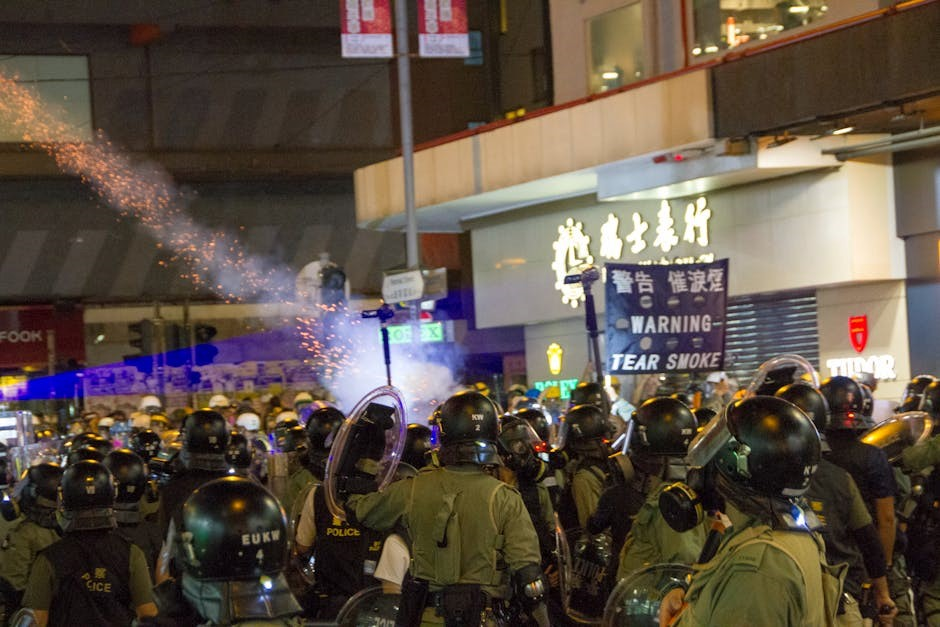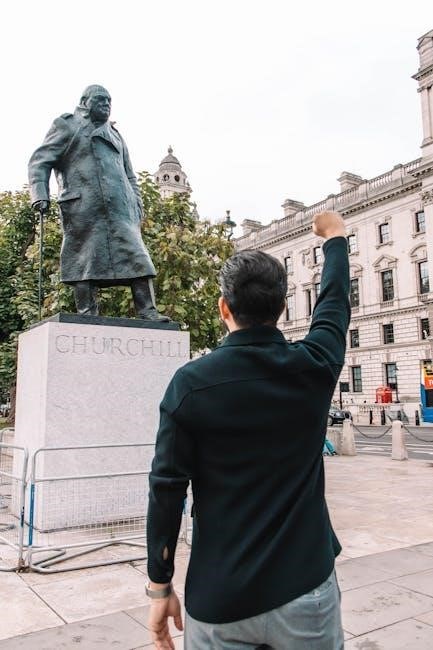Conflict Theory, rooted in Karl Marx’s work, examines societal tensions through class struggle, highlighting capitalism’s role in perpetuating inequality and shaping social structures.
1.1. Overview of Conflict Theory
Conflict Theory, rooted in Marx’s ideas, views society as a battleground for resources and power, emphasizing class struggles and economic systems. It examines how inequality arises from capitalist structures, where the bourgeoisie exploit the proletariat. This theory highlights the inherent tensions between classes, arguing that such conflicts drive social change. By focusing on power dynamics and material conditions, Conflict Theory provides a critical lens to understand societal hierarchies and the role of capitalism in perpetuating inequality.
1.2. Karl Marx’s Role in Developing Conflict Theory
Karl Marx laid the foundation for Conflict Theory by emphasizing class struggle as the engine of social change. His analysis of capitalism revealed how the bourgeoisie exploit the proletariat, creating systemic inequality. Marx’s work introduced concepts like historical materialism and economic determinism, arguing that economic structures shape social relations. His theories provided a framework for understanding power dynamics and remain central to Conflict Theory, offering insights into the roots of societal tensions and the potential for revolutionary change.
1.3. Relevance of Conflict Theory in Modern Society
Conflict Theory remains highly relevant in modern society, offering a lens to analyze contemporary issues like income inequality, worker exploitation, and social injustice. Marx’s ideas help explain how capitalism perpetuates disparities, influencing movements like Occupy Wall Street and debates on wealth distribution. The theory’s emphasis on power dynamics and class struggle continues to inform discussions on globalization, labor rights, and social change, demonstrating its enduring applicability in understanding and addressing societal conflicts today.

Core Principles of Conflict Theory
Conflict Theory examines societal conflict arising from economic and social inequalities, emphasizing class struggle between bourgeoisie and proletariat, shaped by economic systems and capitalist structures perpetuating inequality.
2.1. Class Struggle: Bourgeoisie vs. Proletariat
Class struggle is central to Marx’s Conflict Theory, pitting the bourgeoisie (capitalist class) against the proletariat (working class). The bourgeoisie own the means of production, exploiting the proletariat’s labor for profit. This economic exploitation creates alienation and inequality, fostering resentment. Marx argued that capitalism perpetuates this divide, with the bourgeoisie maintaining power through ideological and institutional control. Historical developments like the Industrial Revolution intensified these tensions, fueling Marx’s belief in the inevitability of proletarian revolution to abolish class distinctions and achieve economic equality.
2.2. Economic Determinism and Historical Materialism
Economic determinism posits that economic structures shape societal development, influencing culture, politics, and consciousness. Marx’s historical materialism explains history as a progression of class struggles, driven by material conditions. He argued that society’s economic base determines its superstructure, including ideologies and institutions. This framework emphasizes how economic systems, like capitalism, shape social relations and conflict. By analyzing material conditions, Marx aimed to uncover the root causes of inequality and predict societal transformation.
2.3. The Role of Capitalism in Perpetuating Inequality
Capitalism, according to Marx, perpetuates inequality by concentrating wealth and power in the hands of the bourgeoisie, while the proletariat remains exploited. The capitalist system relies on profit derived from the surplus value of workers’ labor, fostering economic disparities. This exploitation alienates workers from their labor and creates a cycle of dependency. Capitalism’s inherent inequality is not merely economic but extends to social and political realms, reinforcing class divisions and perpetuating systemic injustice.

Historical Context of Marx’s Work
Marx’s work emerged during the Industrial Revolution, a period of societal upheaval marked by the rise of capitalism and significant economic inequality in 19th-century Europe.
3.1. The Industrial Revolution and Its Impact on Society
The Industrial Revolution transformed societies from agrarian economies to industrialized ones, creating factories and new social systems. This era brought technological advancements but also exploited workers, widening inequality. Marx observed how capitalism emerged from this revolution, fostering class divisions and alienation. The proletariat grew in number, facing harsh working conditions, while the bourgeoisie accumulated wealth. This period laid the foundation for Marx’s critique of capitalism and his theory of class struggle, highlighting the need for societal change to address these injustices and inequalities.
3.2. The Rise of Capitalism in 19th-Century Europe
The rise of capitalism in 19th-century Europe reshaped economic and social structures, creating a system dominated by private property and profit. Marx viewed this era as pivotal, where the bourgeoisie amassed wealth through industrial production, while the proletariat became dependent on wage labor. Capitalism’s expansion intensified class divisions, fostering exploitation and inequality. Marx argued that this system inherently created conflict, as the bourgeoisie controlled the means of production, alienating workers from their labor and perpetuating economic and social disparities;
3.3. Marx’s Observations on Social and Economic Inequalities
Marx meticulously analyzed the deepening social and economic inequalities of his time, attributing them to capitalism’s inherent exploitative nature. He observed that industrialization widened the gap between the bourgeoisie and proletariat, with workers being stripped of their humanity through alienating labor. Marx argued that capitalism’s pursuit of profit perpetuated poverty and inequality, creating a system where the wealthy amassed power while the working class remained exploited and disenfranchised.

Key Concepts in Marx’s Conflict Theory
Marx’s conflict theory introduces alienation, exploitation, and false consciousness, exploring how capitalism creates division and controls the proletariat, shaping societal conflict and inequality structures.
4.1. Alienation and Its Effects on the Proletariat
In Marx’s conflict theory, alienation refers to the estrangement of workers from their labor, products, and humanity under capitalism. The proletariat becomes disconnected from their creative potential, as their work is reduced to a commodity. This alienation fosters a sense of powerlessness and disatisfaction, reinforcing class divisions and perpetuating the capitalist system’s exploitation. Marx argued that capitalism’s structure inherently alienates workers, hindering their ability to achieve true self-realization and collective empowerment.
4.2; Exploitation of the Working Class
Marx’s conflict theory emphasizes the exploitation of the proletariat by the bourgeoisie through the extraction of surplus value. Workers are paid less than the value they produce, with capitalists profiting from the difference. This exploitation perpetuates inequality, as the bourgeoisie accumulate wealth and power, while the proletariat remains economically dependent. Marx argued that this systemic exploitation is inherent to capitalism, fueling class conflict and maintaining the dominance of the ruling class over the working class.
4.3. The Concept of False Consciousness
False consciousness refers to the proletariat’s adoption of the bourgeoisie’s ideology, obscuring their true interests. Marx argued that the ruling class manipulates societal beliefs, fostering illusions that maintain their dominance. This misperception prevents workers from recognizing their exploitation, hindering revolutionary action. False consciousness sustains inequality by aligning the working class with capitalist values, thereby preserving the status quo and stifling collective resistance against oppression.

Practical Applications of Conflict Theory
Conflict theory provides frameworks to analyze societal power dynamics, understand inequality, and address issues like labor rights, social justice, and systemic oppression, guiding strategies for change.
5.1. Analyzing Power Dynamics in Society
Conflict theory offers a lens to examine how power is distributed and maintained in society, emphasizing class relations and economic structures. It highlights how dominant groups, such as the bourgeoisie, use institutions to perpetuate their influence, often at the expense of marginalized classes. This framework helps identify systemic inequalities and the mechanisms that sustain them, providing insights into how power imbalances shape social interactions and opportunities for collective action to address these disparities.
5.2. Understanding Social Movements and Revolutions
Conflict theory provides a framework for understanding social movements and revolutions as responses to systemic inequality and oppression. Marx viewed these movements as expressions of class struggle, driven by the proletariat’s resistance to exploitation. Revolutions, in this context, aim to dismantle oppressive systems and establish new social structures. By analyzing power dynamics and economic conditions, conflict theory helps explain the motivations and outcomes of such movements, offering insights into how collective action can lead to transformative social change.
5.3. Applying Conflict Theory to Contemporary Issues
Conflict theory remains relevant in addressing modern issues like income inequality, worker exploitation, and social injustice. Marx’s ideas help analyze how capitalist systems perpetuate disparities, informing strategies for systemic change. Contemporary movements, such as labor rights campaigns and anti-capitalist protests, draw from conflict theory to challenge power structures. By focusing on class dynamics and economic power, the theory provides a lens to understand and address ongoing inequalities in society today.

Criticism and Debates Surrounding Conflict Theory
Conflict theory faces criticism for its rigid class binary and economic determinism, with some arguing it oversimplifies social complexities and neglects non-class-based inequalities and dynamics.
6.1. Critiques of Marx’s Economic Determinism
Marx’s economic determinism is critiqued for reducing all social phenomena to economic structures, neglecting the role of race, gender, and culture. Critics argue that this narrow focus oversimplifies complex societal dynamics and ignores non-economic forms of domination. Additionally, the theory’s emphasis on class struggle as the primary driver of historical change is seen as too rigid, failing to account for diverse experiences and multiple axes of oppression. This critique highlights the limitations of a solely materialist perspective.
6.2. Challenges to the Binary Class Structure
Marx’s binary class structure, dividing society into bourgeoisie and proletariat, is challenged for oversimplifying social stratification. Critics argue that modern societies exhibit diverse class compositions, including the petit bourgeoisie, managers, and professionals, which Marx’s framework does not adequately address. Additionally, the rise of the middle class and globalization has blurred traditional class boundaries, highlighting the limitations of a strictly binary model. This critique underscores the need for a more nuanced understanding of class dynamics in contemporary societies.
6.3. Counterarguments from Alternative Sociological Perspectives
Alternative sociological perspectives, such as functionalism and symbolic interactionism, critique Marx’s conflict theory for its emphasis on class struggle. Functionalists argue that society is held together by shared values and interdependence, not just conflict. Meanwhile, feminists and intersectional theorists highlight the theory’s oversight of gender and race in shaping inequality. These critiques suggest that Marx’s framework, while insightful, lacks the complexity needed to address diverse forms of oppression and social dynamics beyond class.

The Role of Capitalism in Conflict Theory
Capitalism drives class conflict by prioritizing profit over equality, creating systemic exploitation and inequality between the proletariat and bourgeoisie, fueling Marx’s critique of class struggle.
7.1. Capitalism as a Source of Class Conflict
Capitalism, as a socio-economic system, inherently fosters class conflict by creating unequal power dynamics between the bourgeoisie and proletariat. Marx argued that capitalism thrives on the exploitation of the working class, where profit is derived from surplus value generated by labor. This systemic inequality leads to class consciousness and struggle, as the proletariat becomes aware of its alienation and the unfair distribution of resources. Capitalism’s emphasis on private property and profit maximization exacerbates these divisions, fueling ongoing conflict between classes.
7.2. The Accumulation of Wealth and Power
The accumulation of wealth and power under capitalism is central to Marx’s analysis. Capitalists, or the bourgeoisie, reinvest profits to expand production, further concentrating their wealth. This cycle perpetuates economic dominance, as ownership of capital allows the bourgeoisie to control resources and labor. The proletariat, lacking capital, remains dependent on wage labor, unable to accumulate wealth. This disparity in wealth and power deepens class divisions, reinforcing the capitalist class structure and perpetuating inequality.
7.3. The Role of Private Property in Perpetuating Inequality
Private property is a cornerstone of capitalist inequality, according to Marx. The bourgeoisie’s ownership of the means of production enables them to exploit the proletariat’s labor for profit; This creates a system where wealth and resources are concentrated in the hands of a few, while the majority remain disempowered. Private property perpetuates class divisions, as it ensures the bourgeoisie’s control over economic and social structures, solidifying their dominance and maintaining inequality.

Influence of Marx’s Conflict Theory on Later Sociologists
Marx’s conflict theory shaped later sociologists like Max Weber and Antonio Gramsci, who expanded on class struggle, incorporating themes like bureaucracy and cultural hegemony into their frameworks.
8.1. The Work of Max Weber and Its Relation to Marx
Max Weber expanded on Marx’s conflict theory by introducing concepts like bureaucracy and authority, while acknowledging Marx’s focus on class struggle. Weber argued that social stratification involves more than just economic factors, incorporating status and power dynamics. His work complements Marx by exploring how bureaucracy and rationalization reinforce inequality, offering a broader sociological framework. Weber’s theories on authority types and the Protestant Ethic diverge from Marx but share a critical eye on societal structures, contributing to a richer understanding of conflict and power.
8.2. The Contributions of Antonio Gramsci to Conflict Theory
Antonio Gramsci expanded Marx’s conflict theory by introducing the concept of cultural hegemony, emphasizing how ruling classes maintain power through ideological dominance rather than force. He argued that the proletariat’s acceptance of capitalist values prevents revolution, highlighting the role of education and media in perpetuating inequality. Gramsci’s theory of the “organic intellectual” also stressed the need for working-class leaders to challenge dominant ideologies, offering a strategic approach to achieving social change beyond Marx’s economic focus.
8.3. Modern Interpretations and Adaptations of Marx’s Ideas
Modern scholars have reinterpreted Marx’s conflict theory to address contemporary issues like globalization, digital labor, and intersectionality. Academics such as David Harvey and Nancy Fraser integrate Marx’s ideas with feminist and postcolonial theories, highlighting how capitalism intersects with race, gender, and imperialism. These adaptations emphasize the flexibility of Marx’s framework in analyzing modern inequalities, proving its enduring relevance in understanding power dynamics and social injustice in the 21st century.

Conflict Theory and Social Change
Conflict theory highlights the role of class struggle in driving social change, emphasizing collective action and class consciousness to challenge systemic inequality and oppression.
9.1. The Role of Class Consciousness in Social Change
Class consciousness, a cornerstone of Marx’s theory, refers to the proletariat’s recognition of shared interests and unity against capitalist exploitation. This awareness fosters collective action, enabling the working class to challenge oppressive systems. By uniting, workers can demand better conditions, wages, and rights, ultimately striving for a classless society. Historical movements, like labor strikes and socialist revolutions, exemplify how class consciousness drives transformative change, aligning with Marx’s vision of empowering the proletariat to achieve true social equity and justice.
9.2. The Potential for a Classless Society
Karl Marx envisioned a classless society as the ultimate goal of communist revolution, where class distinctions cease to exist. This society would abolish private property and establish communal ownership of production, eliminating exploitation and inequality. In such a system, individuals would contribute based on ability and receive according to need, fostering true social equality. While this ideal remains aspirational, it highlights Marx’s belief in humanity’s potential to transcend capitalism and achieve a more equitable and just social order.
9.3. The Importance of Collective Action
In conflict theory, collective action is essential for challenging oppressive systems. Marx emphasized that unity among the proletariat could overturn capitalist exploitation. By organizing and acting collectively, workers can resist inequality and demand systemic change. Collective action fosters solidarity, amplifies voices, and creates the power needed to transform society. It is through unified efforts that marginalized groups can challenge dominant structures and strive for a more equitable social order, aligning with Marx’s vision of revolutionary change.
Conflict theory, as developed by Karl Marx, emphasizes the class struggle between the bourgeoisie and proletariat, highlighting capitalism’s role in perpetuating inequality and advocating for collective action to achieve social change.
10.1. Summary of Key Points
Karl Marx’s conflict theory highlights class struggle between the bourgeoisie and proletariat, emphasizing capitalism’s role in inequality. Marx argued that capitalism alienates workers and perpetuates exploitation through economic systems. His theories, outlined in works like Das Kapital, advocate for a classless society and collective action to achieve social change. Conflict theory remains relevant in analyzing power dynamics and understanding social movements, offering insights into addressing contemporary issues rooted in economic and social disparities.
10.2. The Enduring Relevance of Conflict Theory
Karl Marx’s conflict theory remains highly relevant today, offering insights into modern societal inequalities. Its analysis of class struggle and capitalism’s exploitative nature continues to resonate, particularly in examining income inequality, labor rights, and social justice movements. Marx’s ideas provide a framework for understanding power imbalances and advocating for systemic change, ensuring conflict theory’s enduring influence in sociological thought and activism. Its principles are widely applied in contemporary critiques of capitalism and efforts to address social inequities.
10.3. Final Thoughts on the Application of Marx’s Ideas
Karl Marx’s ideas remain foundational in analyzing societal structures and inequality. Conflict theory’s emphasis on class struggle and economic systems continues to inspire critiques of modern capitalism. While some aspects of Marx’s work have been debated, his focus on power dynamics and exploitation offers valuable insights for addressing contemporary issues like income disparity and labor rights. His theories encourage critical thinking about systemic change and the role of collective action in achieving social justice.

Resources for Further Reading
Explore key PDFs on conflict theory, Marx’s original texts like Das Kapital, and contemporary analyses for deeper insights into class struggle and societal structures.
11.1. Recommended PDFs on Conflict Theory
Essential PDFs include Karl Marx’s The Communist Manifesto and Das Kapital, offering foundational insights into class struggle and capitalism. Additional resources like Conflict Theory and Society by Randal Collins and Marx’s Conflict Theory in the 21st Century provide modern applications. These PDFs are available on academic platforms like JSTOR, Google Scholar, and university libraries, ensuring accessible learning for students and researchers exploring Marx’s sociopolitical framework.
11.2. Key Texts by Karl Marx
Karl Marx’s seminal works include The Communist Manifesto and Das Kapital, which outline his theories on class conflict and capitalism. Other essential texts are The German Ideology and Economic and Philosophic Manuscripts of 1844, addressing alienation and historical materialism. PDF versions of these works are widely available on platforms like Marxist.org and academic databases, offering insights into Marx’s sociopolitical framework and its relevance to conflict theory.
11.3. Contemporary Applications and Analysis
Contemporary scholars apply Marx’s conflict theory to analyze modern issues like inequality, neoliberalism, and labor exploitation. PDF resources explore how Marx’s ideas explain current economic disparities, the rise of the gig economy, and the digital age’s impact on class dynamics. Modern analyses also address intersectionality, linking race, gender, and colonialism to class struggle, offering a fresh lens on Marx’s framework for understanding societal conflicts and advocating for systemic change.
